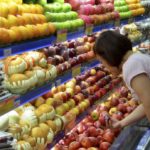The dirtiest places in supermarkets can actually be the locations that people are least cautious and vigilant about.
The dirtiest places in supermarkets
The following positions are not cleaned as you think, on the contrary, they pose a health threat because they contain a lot of bacteria.
Fruit and vegetable stands
People often have the habit of directly holding fruits and vegetables to check for ripeness. Therefore, before being put into your shopping cart, the products have passed through many hands. The organization “Reuse This Bag” points out that fruit and vegetable stands have three times more bacteria than toothbrush holders.
Supermarket staff regularly spray water on fruits and vegetables to keep them fresh, but the sprayer is a place where bacteria can easily thrive. Dr. Connie Morbach, a microbiologist at Michigan, USA, says that if you inhale the mist from this sprayer, you are prone to respiratory infections.
To ensure safety when buying these products, it is best to use plastic bags or gloves to hold them. Before eating or cooking, they need to be thoroughly washed to ensure hygiene.

Grocery carts
Grocery carts may look shiny, but they are actually objects that come into contact with almost everything in the supermarket. They are one of the most bacteria-contaminated items due to their high contact and circulation. A study from the University of Arizona, USA, found that there are more bacteria on grocery carts than in toilet water.
Food bags
Dr. Kevin Morano, a microbiology professor at the University of Houston, USA, said that if food bags are not regularly cleaned, salmonella and E. coli bacteria can easily cling to them. At suitable temperatures and humidity, food bags can become breeding grounds for bacteria.
Experts recommend that shopping bags should be cleaned regularly and thoroughly dried before use. Meat, fresh fruits, vegetables, and ready-to-eat food should be tightly packaged in separate bags.
Freezer doors
Freezer doors are also one of the most frequently touched areas in supermarkets. A study showed that the piece of adhesive tape on freezer door handles has 1,235 times more bacteria than the piece of tape on the surface of a regular mobile phone.
To limit contact with bacteria, you should minimize touching freezer doors if not necessary. If you have to touch them, wash your hands immediately afterward.
Children’s seats in grocery carts
Dr. Michael Schmidt, a microbiologist at the University of South Carolina, USA, said that children’s seats in grocery carts can spread staphylococcus and streptococcus bacteria (bacteria found in feces); it could be due to children wearing diapers and inadvertently spreading bacteria.
To avoid the risk of children being infected in supermarkets, parents should limit them from sitting in shopping cart seats and ensure that they wash their hands after going to the supermarket.
Checkout areas
Many people are not aware that checkout areas are one of the dirtiest places in supermarkets, but the truth is they are.
Poultry, fish, and other produce placed on conveyor belts are prone to cross-contamination. Among them, Escherichia coli, Staphylococcus aureus… have the ability to cause food poisoning. To ensure safety, these foods should be kept in sealed bags when placed on the checkout counter. After bringing the food home, you need to wash it thoroughly before use.
In addition, payment card readers at the checkout counter are also the most bacteria-laden places in supermarkets or grocery stores, according to a study by Marketplace. This device is circulated among users, which spreads bacteria. It is also not continuously cleaned.
To avoid the risk of diseases from the dirtiest places in supermarkets, you should wash your hands before and after shopping.
According to VTC


































